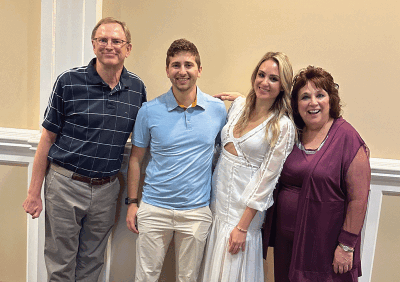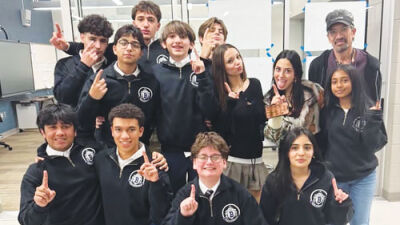
Thanks to CAR-T therapy, Peter Grantz can be at his daughter’s wedding.
Photo provided by Peter Grantz
BLOOMFIELD HILLS — The first CAR-T therapy patient at Corewell Health’s Beaumont Hospital, Royal Oak, plans to walk his daughter down the aisle in September.
Peter Grantz, a Bloomfield Hills resident and three-time cancer survivor, is now in remission after being treated by Corewell Health.
In 2016, Grantz was originally diagnosed with diffuse large B cell lymphoma, a type of non-Hodgkin’s lymphoma. For treatment, Grantz received chemotherapy and targeted therapy. However, he had a recurrence in 2021.
This recurrence was unexpected, since it was past the two-year timeframe when patients typically experience a recurrence.
During this time, Grantz had high-dose chemotherapy, followed by autologous stem cell transplantation. Unfortunately, his lymphoma progressed following this transplant.
“I met him when his diffuse large B cell lymphoma recurred again despite all the available standard therapy,” said Dr. Ishmael Jaiyesimi — the chief the medical hematology and oncology, and cellular therapies department program director at Corewell Health’s Beaumont Hospital, Royal Oak. “He was sent to our team for consideration for other options of therapy that include the new innovative CAR-T therapy for refractory/relapsed lymphoma.”
What is CAR-T therapy?
On Dec. 19, 2022, Grantz became Corewell Health Beaumont Hospital, Royal Oak’s first CAR-T therapy patient.
Grantz said it was convenient to have the treatment close to home, and he likes Beaumont’s facilities, technologies and doctors.
CAR-T therapy is an advanced immunotherapy for patients with certain types of blood cancers, such as Grantz’s diagnosis.
“CAR-T cell therapy takes a patient’s T-cells, which is a type of immune system cell, and modifies them in a laboratory to attack cancer cells. Through a process that we call apheresis, the blood is drawn for the patient,” Jaiyesimi said.
The T-cells are then separated from the blood, and a special receptor that binds to a certain protein in the patient’s cancer cells is added to the T-cells. The special receptor is called a chimeric antigen receptor, or CAR. Large amounts of these CAR-T cells are grown in the laboratory, strengthened and then reintroduced back into the patient’s body through infusion. Once inside the body, the CAR-T cells start attacking the cancer cells.
“The CAR-T therapy brings hope to some of our patients with refractory lymphomas, myeloma, and with each patient we have treated, we continue to learn new innovations and challenges that help us get better in the clinic and in the hospital on how we care for our patients today and in future,” Jaiyesimi said.
Jaiyesimi added that this treatment is new and there are some side effects that patients may experience.
“We continue learning about this therapy,” Jaiyesimi said.
Grantz’s experience with treatment
Grantz said the qualification process for CAR-T therapy was a little bit more rigorous than the ones he went through for other treatments.
“The pre-testing is harder, but you don’t go through that real harshness of the heavy chemo, and that is kind of the biggest difference,” Grantz said.
Grantz said that after other types of treatments, he would feel much worse and would not leave bed for a week.
“It (CAR-T therapy) is much less invasive. You do get tired, and then I did have some side effects for a short period of time, but you are out much quicker,” Grantz said.
Throughout Grantz’s treatment, he tried his best to do his part in maintaining a healthy diet, staying in shape and staying on top of doctors’ appointments.
“From a patient standpoint, we looked at it and saw what we can control and what we can do from a day-to-day basis,” Grantz said.
Grantz also recommends listening to doctors rather than scrolling the internet, since that can often cause fear and anxiety.
“Part of the reason we wanted to do this with Beaumont is we said, if we can help get the program up and running and established, then that will be something we look back and say that we helped out the community,” Grantz said.
Walking his daughter down the aisle
On Sept. 9, Grantz looks forward to walking his daughter down the aisle on her wedding day.
Throughout his treatment, Grantz said, they made sure to always believe and maintain hope.
Grantz said he thinks they have picked the father-daughter dance song. The first concert they went to together was NSYNC, so he found it fitting to include an NSYNC song on the big day.
Grantz thanked his doctors and nurses that he has worked with throughout this process.
 Publication select ▼
Publication select ▼





















